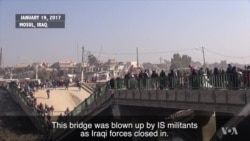People in the city of Mosul have set up a market on a broken bridge.
The bridge is one of several damaged or destroyed in fighting between Iraqi government troops and Islamic State (IS) militants. Government troops now control almost all of Mosul east of the Tigris River.
Sixteen-year-old Ahmed says the militants “blew up most or all of the bridges before the army arrived. Maybe it was strategic. But I think they just want(ed) to destroy things.”
The market opened just a few days after IS militants were forced out of the area two weeks ago. Helicopters still attack militants in some nearby neighborhoods. Smoke can be seen rising from airstrikes and shells exploding. But the market continues to grow.
A man named Mohammed sells dairy products, frozen chickens and bottled water on the bridge.
“I didn’t choose to stay and live under Islamic State rule,” he says. “But where else would I go?”
Mohammad is joined by others selling fruit, credit for telephone service, cleaning products and other goods. On the street near the bridge, people sell fuel, snack foods, cigarettes and other things. Groups of young men sell vegetables. Another young man sells containers filled with cooking gas.
Over the past few months of IS rule, prices in Mosul rose sharply. Food and fuel prices were five to 15 times their usual level. The increases harmed many people in Mosul.
Prices are now back to normal. But people say they and others have little money to spend.
People selling goods on the bridge say they are much happier now than they were in the past few months. They say the militants became cruel as Iraqi army troops moved closer to the city.
A young man says he helps people move goods from place to place, using his wooden cart. He says he earns $8 to $12 a day for this service. Carts like his must be used because automobiles are banned in areas of the city controlled by government forces. That is because troops fear the vehicles will be used by suicide bombers.
But Iraqis are still moving around the city. Some of them are returning to the homes from which they fled. Others are fleeing Mosul. And many people are searching for supplies after many months -- or even years -- of isolation.
I’m Christopher Jones-Cruise.
VOA Correspondent Heather Murdock reported this story from Mosul. Christopher Jones-Cruise adapted her report into Learning English. George Grow was the editor.
We want to hear from you. Write to us in the Comments Section, or visit our Facebook page.
_______________________________________________________________
Words in This Story
strategic – adj. of or relating to a general plan that is created to achieve a goal in war, politics, etc.,
dairy – adj. relating to foods made from milk
snack – n. a small amount of food eaten between meals
cart – n. a small wheeled vehicle that is pushed
isolation – n. the state of being in a place or situation that is separate from others





